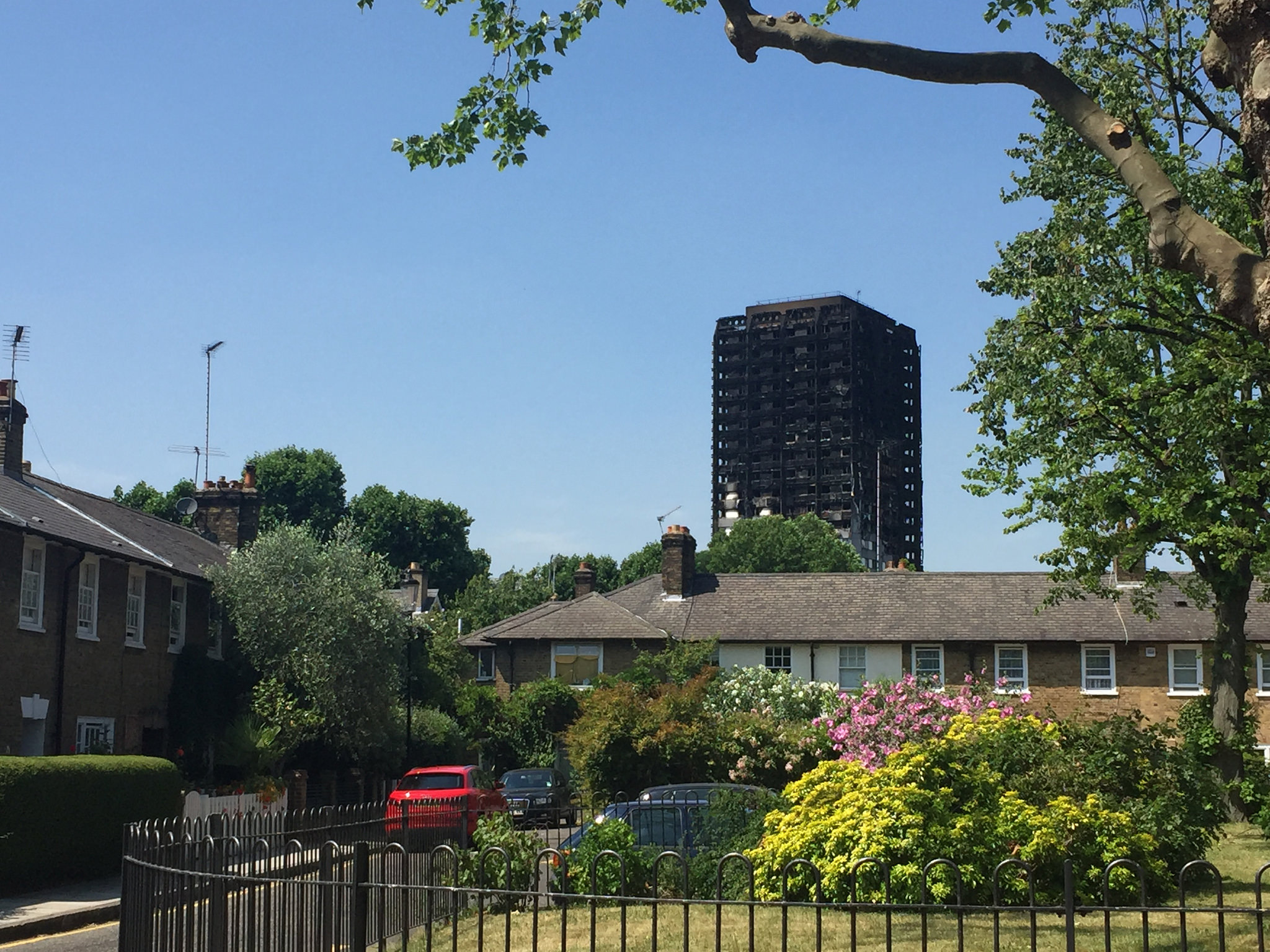Following the ‘After Grenfell’ Report, It’s No Surprise Tories Are on the Attack
by Nathan Akehurst
14 November 2017

Take a walk from where the Grand Union canal winds in the shadow of gasholders and towers – Trellick, Dixon, Whitstable, Grenfell and more – through bustle, antiques and street food in the Portobello Road market, to the milky mansions of Notting Hill and onto the Royal Parks, past the Victoria & Albert and Harrods, and come to a stop beneath London’s most expensive flat just before where Wellington Arch glares over whirling roundabout traffic.
You will have passed through places where life expectancy drops by years when you cross a road, where child poverty rates range between 6% and over 50%, and where a ward in which seven in ten homes are overcrowded sits in the same borough as a street where seven in ten homes are empty or second properties.
I’ve written extensively about the sliver of London I grew up in before and after the Grenfell Tower fire, and interviewed Emma Dent Coad – author of this week’s After Grenfell report into inequality in Kensington – a couple of months ago. Yet even I was surprised by the headline figures of her research: a life expectancy gap of over two decades, nearly 6000 homeless residents, and 4500 children in poverty.
The statistics don’t capture the stories behind them. Cleaners walking for an hour to work through Europe’s wealthiest streets because their wages don’t pay the bus fare. A dentist warning of babies being born with insufficient calcium owing to malnourished parents. Mrs Braithwaite in her three-bedroom council house paying only £10 a week less in council tax than the Sultan of Brunei in a 16-bedroom mansion.
For people who know it, Kensington has always been a byword for staggering inequality. The horrors of Grenfell Tower introduced that byword to the country at large, and the new report provides unparalleled context. It is relatively short but packed with detail on everything from development regulations to diabetes cases. It’s not a dreary thinktank document; it’s alive and angry.
These stories and these statistics have a cause. The extremes in the borough aren’t inevitable, or even necessarily the fault of the luckier people. They are the product of a national approach, but also of a council leadership which has systematically neglected people in its care while mocking people who dare raise concerns (up to and including shouting at them to “shut up” in public.)
To understand the absence of contrition from the Conservatives even after the fire, one could look at the glacial rehousing rate (300 Grenfell-related children have joined their thousands of pre-Grenfell counterparts in temporary accommodation.) One could also look at the response the day Dent Coad’s report was launched.
Kensington and Chelsea’s spin operation – which aggressively briefs journalists at 2am, I am told by one source; if only that energy was going into the rehousing effort – was there to remind us that other boroughs have rickets too. A councillor dismissed the report as “fake facts” in true Trumpian style, while the new council leader called Dent Coad “opportunistic” for continuing to discuss the issues she has spent her political career highlighting.
Instead of listening, they attacked. Failed Conservative MP Shaun Bailey (who is insistent that poor people have no right to live in their home areas) was deployed to brand Dent Coad a bigot for an ancient blog post. In it she quotes language she argues Bailey used to describe his own background, to make the point that people in his area resent his characterisation of it. She also attacks the Conservatives’ tokenism and inability to accept people from different backgrounds; sure enough Bailey was cast out by the Number 10 clique shortly after.
Meanwhile Bailey’s London Assembly colleague called estates “ghettos” and “barracks for the poor” and former Kensington housing chief Rock Feilding-Mellen described the Wornington Green estate in north Kensington as a “ghetto” of “fear and paranoia” – both to defend plans to demolish people’s homes with the barest consultation. Apparently quoting such language in a political post is worse than using it to justify the levelling of working-class communities. (Dent Coad was a reliable source of information on the disasters at Wornington Green.)
On the day Dent Coad’s report was launched, the local Conservative party issued surveys to residents asking residents to rate how much they prioritised the issue of the Grenfell fire on a scale of zero to ten. If you happen to be the kind of person that cares ‘zero’ about hundreds of your neighbours being killed or made homeless, they’ve probably done more to seek your view than they did the tower’s residents.
The response vindicates the report’s importance, and the importance of people, particularly local residents, having resources like these to inform political action. And it will echo experiences elsewhere. At the report’s launch, shadow chancellor John McDonnell said it was a model that “other MPs should be doing.” He’s right – ‘austerity’ or ‘inequality’ is not experienced as a national phenomenon but a local event; the lift not being fixed, the neighbour moving after a rent hike, the closure of a library or community centre. These voices need to be informing policy.
After Grenfell there is no corner of Britain that would not benefit from having a light shone on who wields wealth and power within it, and in whose interests.